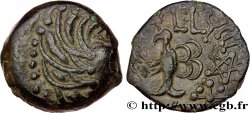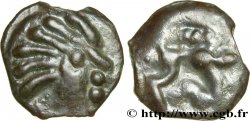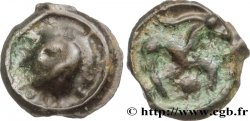bga_250082 - SENONES (Area of Sens) Quart de statère globulaire, sans segment
Not available.
Item sold on our e-shop (2011)
Price : 180.00 €
Item sold on our e-shop (2011)
Price : 180.00 €
Type : Quart de statère globulaire, sans segment
Date: c. 100-80 AC.
Metal : gold
Diameter : 9,5 mm
Weight : 1,83 g.
Rarity : R1
Coments on the condition:
Flan large avec un droit lisse et une dépression au revers
Catalogue references :
Obverse
Obverse legend : ANÉPIGRAPHE.
Obverse description : Lisse, avec la trace du bord du coin.
Reverse
Reverse legend : ANÉPIGRAPHE.
Reverse description : Surface concave avec un segment en relief.
Commentary
Cette monnaie montre la différence entre notre conception moderne d'une belle monnaie et la conception antique d'une monnaie de valeur ; ce quart de statère représentait 1,77 grammes d'or et valait plus qu'un beau petit quart avec une belle chevelure et un élégant cheval, mais de quelques centigrammes de métal précieux de moins...
Pour ces monnaies globulaires, il existe deux types bien distincts ; avec le segment au revers ou avec une dépression très légèrement pointillée, mais sans le segment !
Cet exemplaire plus large et moins épais, presque scyphate, semble présenter un motif indéterminé au revers mais pas un segment.
Pour ces monnaies globulaires, il existe deux types bien distincts ; avec le segment au revers ou avec une dépression très légèrement pointillée, mais sans le segment !
Cet exemplaire plus large et moins épais, presque scyphate, semble présenter un motif indéterminé au revers mais pas un segment.








 Report a mistake
Report a mistake Print the page
Print the page Share my selection
Share my selection Ask a question
Ask a question Consign / sell
Consign / sell
 Full data
Full data



